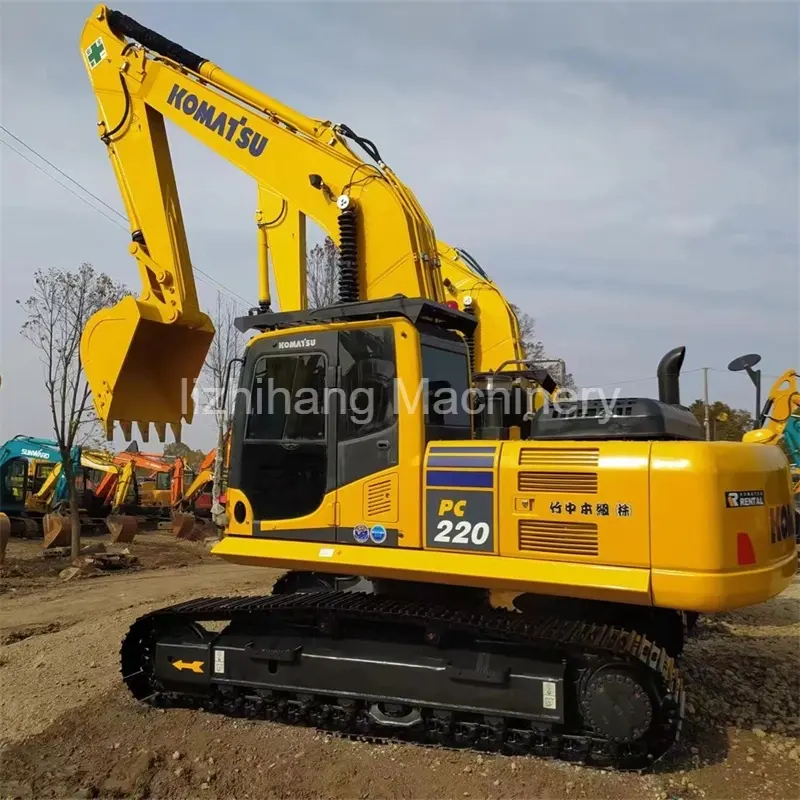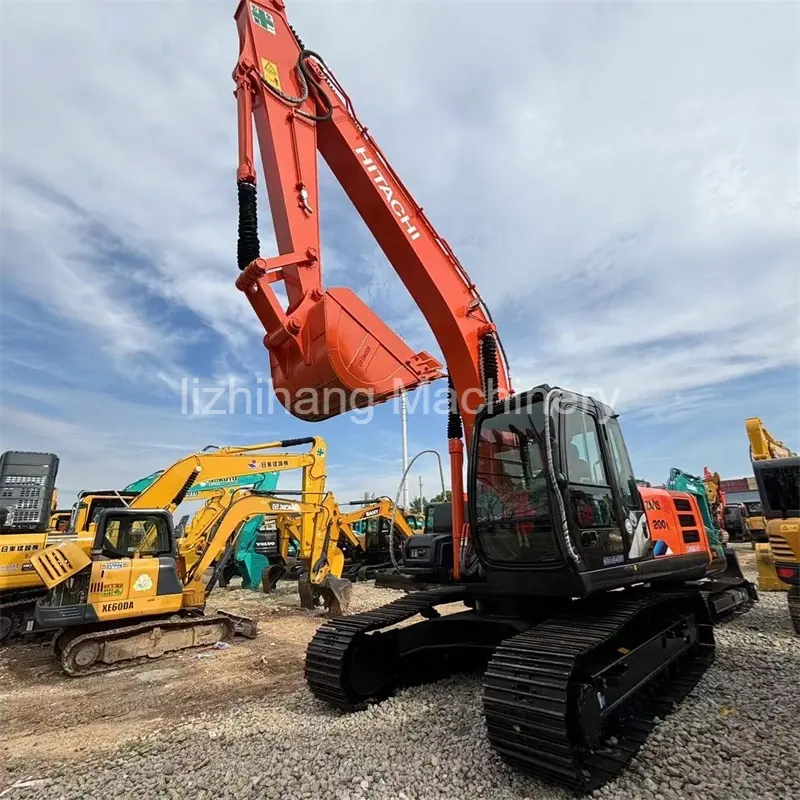Plusieurs questions à poser lors de l'achat d'une excavatrice Hitachi d'occasion
Date de sortie : 2024-12-20
Avec le développement rapide de l'industrie mondiale de la construction, les excavatrices, en tant que l'une des machines de construction les plus importantes, sont devenues l'équipement de base de divers projets d'ingénierie. Cependant, face au prix élevé des produits neufs, de plus en plus d'entreprises choisissent d'acheter des excavatrices d'occasion. Parmi elles, Hitachi, en tant que marque d'excavatrices bien connue, occupe une place sur le marché grâce à ses performances stables et à sa longue durée de vie. Lors de l'achat d'une pelle Hitachi d'occasion, comment s'assurer de choisir un équipement rentable et stable est une question que chaque acheteur doit considérer.
1. La durée de vie et les heures de fonctionnement de l'équipement
Tout d'abord, il est essentiel de comprendre la durée de vie et les heures de travail des excavatrices Hitachi d'occasion. Bien que les excavatrices Hitachi soient d'excellente qualité, chaque machine a sa durée de vie. En règle générale, les heures de travail sont un critère important pour juger de l'état de l'équipement. En règle générale, il est courant que les excavatrices d'occasion aient une durée de travail comprise entre 5 000 et 10 000 heures, tandis que les équipements ayant plus de 12 000 heures peuvent faire face à des coûts de réparation et d'entretien plus élevés. Vous devez évaluer la durée de vie restante de l'équipement en fonction du nombre d'heures de travail. Pour les équipements ayant une longue durée de travail, compte tenu de leur fréquence de travail élevée, vous devrez peut-être accorder une attention particulière à l'état des composants clés tels que le moteur et le système hydraulique.
2. Dossiers de réparation et d'entretien
Comprendre les dossiers de réparation et d'entretien de l'équipement est une étape clé pour déterminer si ses performances sont stables. Les excavatrices Hitachi sont connues pour leur fiabilité et leur durabilité, mais un entretien régulier est essentiel pour maintenir leurs bonnes performances. Demandez au vendeur s'il peut fournir des dossiers d'entretien détaillés, y compris l'heure, le lieu, les éléments et les pièces remplacées de chaque entretien. Ces dossiers peuvent vous aider à déterminer si l'équipement a été régulièrement entretenu et s'il existe un historique de pannes ou de révisions graves. Évitez de choisir un équipement sans dossier d'entretien ou un entretien inadéquat pour éviter des coûts d'entretien élevés à l'avenir.
3. Environnement de travail et conditions d'exploitation de l'équipement
L'environnement de travail de l'excavatrice affecte directement ses performances mécaniques et sa durée de vie. Demandez au vendeur quel est l'environnement de travail spécifique de l'équipement, qu'il s'agisse d'une zone minière, d'un chantier de construction ou d'un projet d'infrastructure urbaine. Les environnements de travail difficiles, tels que les températures élevées, l'humidité élevée et la boue, accélèrent l'usure de l'équipement, en particulier des composants importants tels que le système hydraulique et le moteur. Si l'équipement a fonctionné dans un tel environnement, l'usure de ses composants internes peut être grave, ses différentes performances doivent donc être vérifiées plus attentivement.
4. L'état du moteur et du système hydraulique
En tant que composants principaux des excavatrices Hitachi, l'état du moteur et du système hydraulique détermine directement l'efficacité de travail et la sécurité de l'équipement. Pour le moteur, vérifiez s'il y a des bruits anormaux, des fuites d'huile ou des vibrations excessives, qui sont tous des signes de problèmes potentiels du moteur. Le système hydraulique doit se concentrer sur la vérification des fuites, ainsi que sur la qualité de l'huile hydraulique et si elle est suffisamment propre. Le système hydraulique est une garantie importante pour le fonctionnement de l'excavatrice. Une fois qu'une panne se produit, le coût de la réparation est élevé, il faut donc y prêter une attention particulière.
5. S'il est possible de réaliser un test sur place
Les performances d'une excavatrice d'occasion ne peuvent souvent être pleinement évaluées que lorsque vous la testez vous-même. Lors de l'achat d'une excavatrice Hitachi d'occasion, assurez-vous de demander un test sur site. Grâce à ce test, vous pouvez observer les performances de l'équipement au travail, s'il y a des bruits anormaux, des vibrations, des fuites d'huile, etc. En même temps, le test peut également évaluer la stabilité de l'équipement dans différentes conditions de travail, y compris des fonctions clés telles que le levage, la rotation et le fonctionnement du godet. Grâce au fonctionnement réel, il peut vous aider à juger de la douceur et des performances de fonctionnement de l'équipement.
6. Si une garantie de service après-vente est fournie
Bien que le prix des équipements d'occasion soit relativement bas, cela ne signifie pas que vous ne vous soucierez plus des problèmes de service après-vente après l'achat. De nombreux vendeurs proposent un service après-vente pendant une certaine période ou offrent une période de garantie en cas de panne de l'équipement. En cas de problème avec l'équipement après l'achat, vous pouvez bénéficier de services de maintenance en temps opportun, ce qui peut réduire efficacement vos coûts de maintenance et votre temps de travail. Assurez-vous que le vendeur fournit un contrat de service après-vente détaillé et indique clairement les conditions et la couverture de la garantie.
7. Le prix est-il raisonnable
Enfin, le prix est un facteur qui doit être soigneusement pris en compte lors de l'achat d'une pelle Hitachi d'occasion. Le prix du marché d'une excavatrice d'occasion Le prix d'un équipement est influencé par de nombreux facteurs tels que l'âge de l'équipement, la durée d'utilisation, les conditions d'entretien et la demande du marché. Il est important de comprendre la situation du marché des équipements du même modèle et de la même année pour éviter d'acheter un équipement problématique en raison d'un prix trop bas ou de passer à côté d'autres options plus rentables en raison d'un prix trop élevé. Vous pouvez consulter le marché de l'occasion et demander à d'autres vendeurs ou revendeurs le prix de référence de l'équipement pour vous assurer d'acheter dans une fourchette de prix raisonnable.
L'achat d'une pelle Hitachi d'occasion est un investissement qui nécessite une prise de décision prudente. En posant des questions clés, vous pouvez comprendre pleinement l'état réel de l'équipement et éviter les risques supplémentaires causés par la négligence. Ce n'est que sur la base d'une compréhension complète de la situation de matériel de construction d'occasion pouvez-vous prendre la décision d'achat la plus appropriée et garantir la valeur d'utilisation et la stabilité à long terme de l'excavatrice d'occasion.



